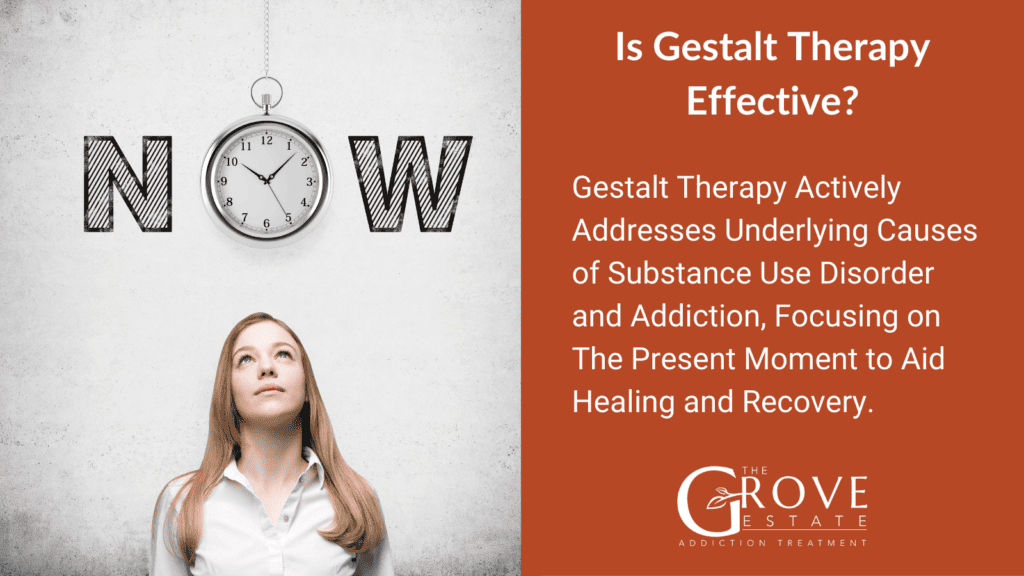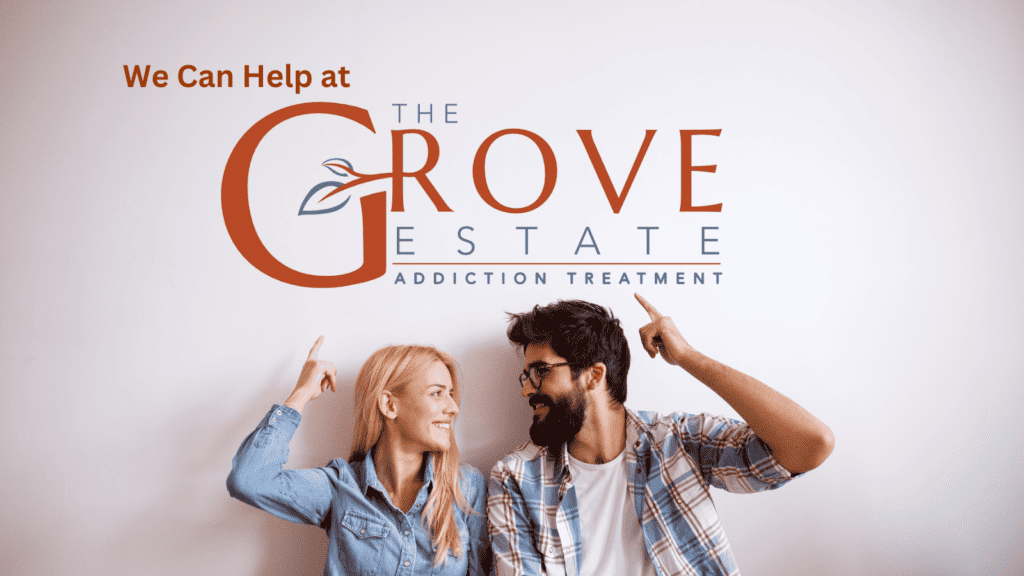Gestalt Therapy, a form of psychotherapy, is increasingly recognized for its application in addressing addiction. Rooted in the belief that individuals can achieve personal growth and emotional well-being by becoming more aware of their thoughts, feelings, and behaviors in the present moment, Gestalt Therapy is characterized by its emphasis on holistic exploration. In this therapeutic approach, the focus extends beyond merely understanding the meaning of one’s addiction, incorporating techniques that encourage self-awareness and acceptance.
Gestalt Therapy uses diverse techniques, like experiential therapy, role-playing, and creative expression, to boost self-awareness and personal growth. Through these methods, individuals gain insights into their present experiences, helping them better understand their addiction dynamics.
Gestalt Therapy’s benefits for addiction treatment are extensive, promoting self-awareness, personal responsibility, and improved emotional regulation and coping skills. Focusing on the present and considering the whole person, facilitates a deeper self-understanding, leading to transformative changes in addiction-related thoughts and behaviors.
Studies, including those by V.A. Dominitz in 2017, demonstrate Gestalt Therapy’s effectiveness in treating addiction, especially in substance use disorder and co-occurring condition populations. Its success stems from addressing the interconnectedness of thoughts, feelings, and behaviors, equipping individuals with a holistic tool to manage addiction challenges.
What is Gestalt Therapy?
Gestalt therapy is a psychotherapeutic approach that was developed by Fritz Perls. It is a humanistic and person-centered form of psychotherapy that focuses on a person’s present life and current challenges. The main goal of Gestalt therapy is to increase a person’s awareness, freedom, and self-direction.
Gestalt therapy emphasizes personal responsibility and focuses on the individual’s experience in the present moment, the therapist–client relationship, and the environmental context. It is a holistic approach that includes mind, body, and culture.
Gestalt therapy is present-centered and related to existential therapy in its emphasis on personal responsibility and self-awareness. It is a creative, experimental type of therapy that aims to help individuals overcome blocks in their lives. Gestalt therapy is effective in improving self-awareness, reducing anxiety, and resolving conflicts.
How Gestalt Therapy Could Help with Addiction Treatment and Recovery?
Gestalt therapy can play a crucial role in addiction treatment and recovery by offering a holistic and experiential approach. This therapeutic modality, which focuses on the present moment, aims to promote personal growth and awareness by addressing unresolved issues from the past that may contribute to current thoughts and behaviors.
In the context of addiction treatment, Gestalt therapy can provide several benefits:
- Understanding Addiction Triggers: Gestalt therapy helps individuals identify and understand the emotional components of their addiction. By exploring current emotions, sensations, and needs, individuals can recognize and address triggers that contribute to addictive behaviors.
- Exploring Underlying Causes: The therapy acknowledges that various factors, including unresolved traumatic experiences, past events, and core beliefs, contribute to addictive behaviors. By addressing these underlying causes, individuals can make positive changes in their lives.
- Improving Relational Skills: Addiction often strains relationships, leading to isolation. Gestalt therapy offers tools and techniques to enhance communication, trust, and intimacy, paving the way for stronger and healthier connections with loved ones.
- Sobriety and Stress Reduction: Gestalt therapy aims to reduce the risk of relapse by identifying triggers and developing new behaviors. Additionally, individuals learn new techniques to manage stress, contributing to overall stress reduction and maintenance of sobriety.
- Holistic Approach: Gestalt therapy is part of a comprehensive addiction treatment plan, integrating naturopathic and allopathic medicine with evidence-based modalities. The holistic approach addresses both addiction and underlying mental health issues.
- Individualized Care: Comprehensive addiction treatment plans are tailored to meet specific needs, including individual therapy sessions and group therapy sessions, and continuing care planning for long-term success.
By actively involving individuals in their current situation, Gestalt therapy encourages personal growth, maturation, and accountability for behaviors. The focus on the present moment allows for a deeper understanding of the consequences of actions and facilitates positive changes in thought processes and perspectives.
What Disorders Can Be Treated with Gestalt Therapy?
- Common mental disorders: Based on the research by Dr. RE Kaisler (2023), Gestalt therapy seems effective for patients with moderate and low integrated personality, suggesting its potential for treating common mental disorders.
- Anxiety and depression: Several studies and sources mention the effectiveness of Gestalt therapy for anxiety and depression, including generalized anxiety disorder and depressive disorders linked to adjustment issues.
- Bipolar disorder: Studies by VA Dominitz (2017) and others like the one done by Daan Van Baalen (2010) highlight the successful application of Gestalt therapy in treating bipolar disorder, demonstrating its ability to address complex psychological issues.
- Substance use disorders: The study by VA Dominitz (2017) specifically demonstrates the effectiveness of Gestalt therapy in treating substance use disorders alongside bipolar disorder.
- Relationship issues: Gestalt therapy is mentioned as beneficial for addressing relationship problems, indicating its potential to improve interpersonal dynamics.
- Borderline personality disorder: The case report by R Knez (2013) showcases the successful use of Gestalt therapy in treating borderline personality disorder, suggesting its potential for managing this complex condition.
- Chronic pain: While not definitively positive, the study by S Ventegodt et al. (2004) explores the use of Gestalt therapy in combination with other therapies for chronic whiplash-associated disorders, hinting at its possible application in pain management.

Is Gestalt Therapy Effective?
Gestalt therapy has shown effectiveness in addressing various mental health conditions, such as anxiety, depression, stress, addiction, and insomnia, according to studies and clinical insights.
However, it’s crucial to note that while existing studies indicate positive outcomes, there is a recognized need for further clinical research to establish more conclusive evidence regarding the overall efficacy of Gestalt therapy.
Scientific research supports Gestalt therapy’s effectiveness, suggesting it is comparable to other therapeutic modalities. Nevertheless, the current body of research highlights the need for ongoing exploration to deepen our understanding of its efficacy.
The Principles of Gestalt Therapy
Gestalt therapy is a humanistic and experiential approach to psychotherapy that focuses on the present moment and the individual’s experience of the world. It is based on several key principles that guide the therapeutic process. Here are the principles of Gestalt therapy:
- Phenomenology: Focuses on individual perception and meaning-making, not just objective facts.
- Existentialism: Emphasizes personal choice, responsibility, and finding meaning in the present.
- Field theory: Sees individual and environment as a dynamic, interconnected system.
- Therapeutic relationship: Builds trust and collaboration to explore internal and external experiences.
- Holistic approach: Addresses mind, body, and emotions as a unified whole.
- Self-awareness: Encourages clients to understand their thoughts, feelings, and behaviors.
- Present-moment focus: Helps clients stay grounded in the “here and now,” not past or future anxieties.
- Authentic contact: Promotes genuine communication and connection with oneself and others.
- Exploration of resistances: Identifies and works through internal blocks to growth and change.
- Resolution of unfinished business: Addresses past experiences that impact the present and hinder progress.
- Creative experiments: Uses playful and expressive techniques for self-discovery and deeper insight.
What Are Gestalt Therapy Techniques
Gestalt therapy uses various techniques to promote self-awareness, self-expression, and emotional processing. These techniques include:
- Words and language: Using “I” statements, focusing on the present moment, and avoiding intellectualization.
- Empty chair technique: Role-playing conversations with an imagined person or part of oneself.
- Role-playing: Acting out different roles to gain new insights and perspectives.
- Two-chair technique: Engaging in a dialogue between different parts of oneself.
- Exaggeration: Exaggerating gestures or expressions to bring unconscious behaviors into conscious awareness.
- Dialogue and self-dialogues: Spontaneous conversations with the therapist or oneself to explore personal conflicts.
- Awareness exercises: Focusing on breathing, body sensations, or emotions to enhance self-awareness and self-regulation.
- Dreamwork: Exploring the meaning of dreams and uncovering latent emotional content.
- Gestalt group therapy, meditation, and guided imagery: Using visualization and mindfulness techniques in a group setting.
- Use of props and objects: Implementing various objects to externalize emotions or conflicts and make them tangible.
- Body awareness techniques: Focusing on physical sensations and movement to process emotions and experiences.

Benefits of Gestalt Therapy for Addiction Recovery
Gestalt therapy offers various benefits, including sobriety support by identifying triggers and developing new behaviors, improved emotional well-being through processing unresolved emotions, and enhanced self-awareness by gaining insights into thoughts, feelings, and actions.
It is effective for anxiety, behavioral health issues, and substance abuse disorders, offering evidence-backed benefits for emotional well-being.
Here are the benefits of Gestalt Therapy for addiction:
- Identifying triggers and developing new behaviors to reduce relapse risk.
- Improved emotional well-being by processing unresolved emotions and cultivating self-compassion.
- Gaining insights into thoughts, feelings, and actions.
- Increased understanding of accountability.
- Enhanced ability to live in the moment.
- Experiential methods to help individuals become more aware of their feelings.
- Expression of feelings in productive ways.
- Evidence-backed benefits for mental health, promoting self-awareness, personal growth, and positive outcomes.
- Focus on self-awareness and being present in the moment to improve mental health.
- Potential benefits include an improved sense of self-control and a better ability to cope.
- Proven effectiveness for depression, self-esteem, relationship difficulties, and more.
- Promotion of awareness of thoughts, emotions, and perceptions for better understanding.
What Are Some Disadvantages of Gestalt Therapy?
Gestalt therapy, a form of psychotherapy, offers numerous benefits, but it also has its limitations. Let’s explore some of the drawbacks:
- Limitation in Addressing Hereditary Psychological Effects: Gestalt therapy may not effectively address psychological effects inherited from hereditary behaviors.
- Limitation in Addressing Factors Independent of Thoughts: It may not be effective for psychological factors that are not influenced by an individual’s thoughts.
- Limited Exploration of the Past: While it is effective for managing stress, anxiety, addiction, PTSD, and depression, a weakness is its limited exploration of the past.
- Requirement for Therapist’s High Personal Development: Gestalt therapy requires therapists to have a high degree of personal development and knowledge, posing a potential weakness.
- Lack of Strong Theoretical Base: One limitation is that Gestalt therapy lacks the strong theoretical base enjoyed by some other therapeutic approaches.
- Not Effective for Certain Populations: Some research indicates that Gestalt techniques may not be effective for prison inmates suffering from psychopathology, suggesting limitations in certain populations.
What Is an Example of Gestalt Therapy in Real Life?
An example of Gestalt therapy in real life involves a client working with a therapist to address their unresolved emotions and enhance self-awareness. During a session, the therapist may employ experiential exercises, such as the “empty chair” technique. In this exercise, the client engages in a dialogical process by interacting with an imaginary person or aspect of themselves represented by an empty chair.
For instance, if a client is struggling with unresolved feelings towards a family member, they may use the empty chair to express their thoughts and emotions directly to the imagined family member. This process allows the client to explore and confront suppressed feelings, gain insights into their emotions, and promote a deeper understanding of their internal conflicts.
Through such experiential exercises and the therapeutic relationship, Gestalt therapy helps individuals explore their present experiences, break through barriers, and develop healthier coping mechanisms for addressing various life challenges.
How Long Does Gestalt Therapy Last?
The positive effects of Gestalt therapy remain stable for several years post-treatment. The therapy incorporates techniques like dream work, guided fantasy, and role-playing.
The duration of Gestalt therapy sessions typically involves weekly one-to-one sessions lasting 50 minutes.
The frequency of therapy is designed to be once a week on a fixed day and time. However, the overall treatment time and its effectiveness vary among individuals, as the results are personalized. Gestalt therapy’s emphasis is on the present life and needs of the individual, focusing on the mind, emotions, body, and spirit for long-lasting benefits.

How the Grove Can Help?
Gestalt Therapy offers insightful perspectives on self-awareness and the healing process, as highlighted in our recent article. However, it’s important to recognize that at The Grove Estate, our approach to addiction treatment encompasses a wide array of therapeutic methods, not limited to Gestalt Therapy alone.
We believe in a holistic and personalized approach to addiction recovery. Our team of professionals is committed to working with you to identify the most effective treatment plan tailored to your individual needs. If you’re seeking support and guidance on your journey to recovery, The Grove is here to offer a variety of therapeutic options. Contact us to learn more about how we can help you reclaim your life, overcome challenges, and build a sustainable path toward health and well-being.

Share This Post



